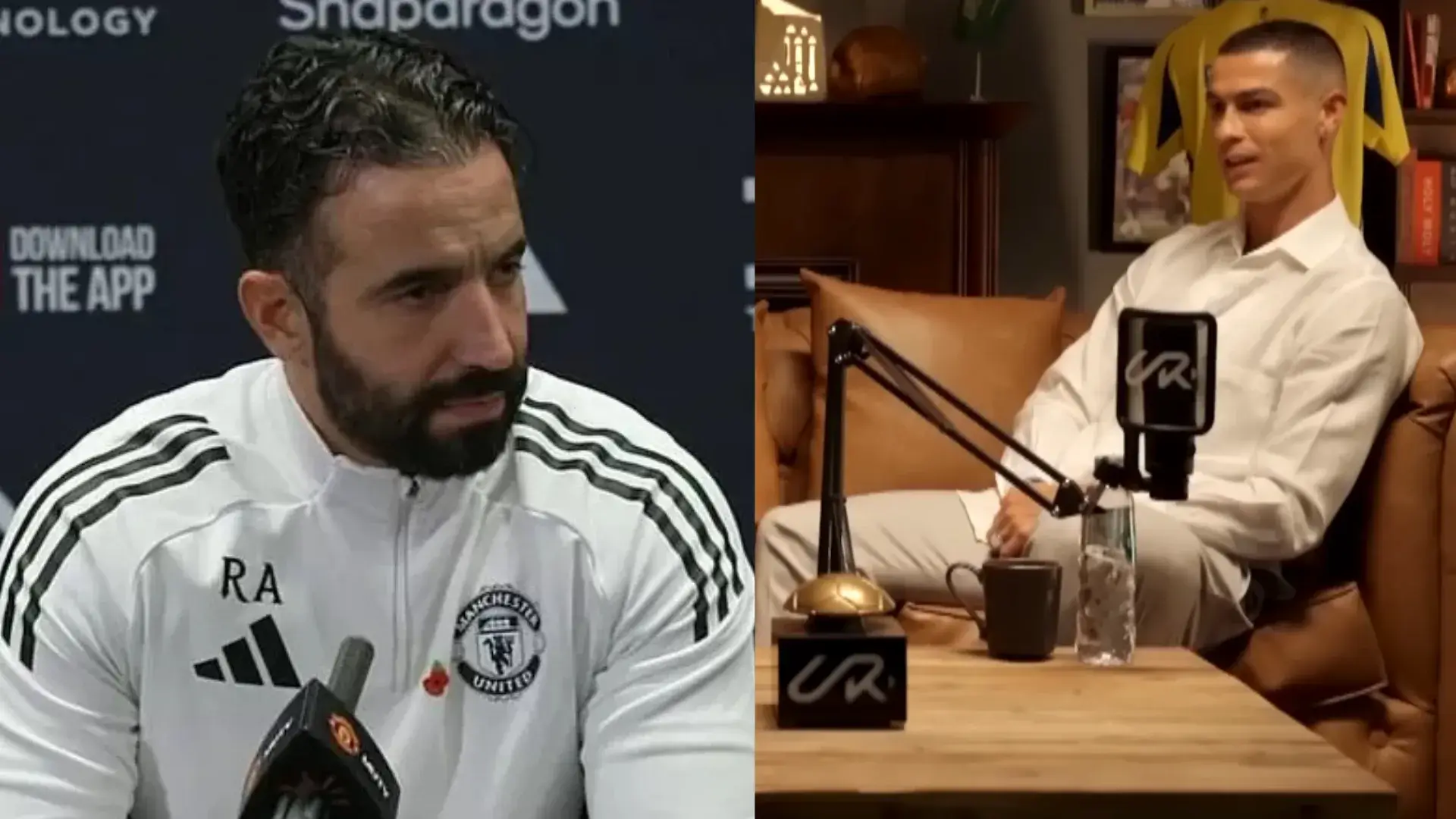
Ruben Amorim delivers brutally honest response to Cristiano Ronaldo's savage Man United criticism (2026)
Cristiano Ronaldo’s recent comments about Manchester United have set the football world talking again. In a candid interview, the Al Nassr forward — a club legend — said Manchester United were “not on a good path” and suggested Ruben Amorim could not perform miracles with the current squad. The remarks prompted a swift media reaction and a measured but firm response from United’s manager, Ruben Amorim.
The Background: Ronaldo’s Critique and Why It Matters
Cristiano Ronaldo remains one of football’s most influential voices. His critique matters because of his history with Manchester United, where he won trophies and earned iconic status. In his new interview, Ronaldo said the club “has no structure” and that Ruben Amorim could not achieve a turnaround without a major overhaul. He also emphasised that some current players might not have the mentality required for success.
Ronaldo’s remarks are rooted in long-standing concerns. After his explosive 2022 Piers Morgan interview that exposed issues behind the scenes, Ronaldo’s follow-up comments — though not entirely new — reignited debates over Old Trafford’s strategic direction and player mentality. Reuters reported that Amorim urged everyone to focus on the future, highlighting recent improvements and structural changes at the club.
Ruben Amorim’s Response: Calm, Confident, and Forward-Looking
Ruben Amorim handled the situation tactically. At his press conference ahead of Manchester United’s match against Tottenham, Amorim acknowledged the club had made mistakes in the past but insisted his focus — and the club’s — was on looking forward. He said the team had improved, praised the benefits of having more time to train and build cohesion without midweek European commitments, and stressed that the club was changing its structure and culture. Sky Sports and ESPN covered his comments extensively. citeturn0search5turn0search21
Amorim avoided personal attacks. Instead, he framed his response around accountability and process: accept past mistakes, build a better foundation, and measure success through sustained improvement rather than instant fixes. That message resonated with supporters who want stability rather than sensational headlines.
What Exactly Did Ronaldo Say? The Key Quotes
Ronaldo’s core claims were blunt and emotive. He said Manchester United were “not on a good path” and that turning the club around would require more than a new manager — it would need systemic change. Importantly, he said Ruben Amorim was “doing his best” but could not work “miracles” with the current squad.
These quotes matter because they come from someone whose opinions carry weight at Old Trafford. Ronaldo’s voice can influence fan sentiment, player morale, and even board-level decisions, not necessarily because he’s involved day-to-day but because of his legacy and global platform. Multiple outlets, including ESPN and The Athletic, echoed these points when reporting the interview.
The Tactical and Cultural Criticisms Behind Ronaldo’s Words
Ronaldo’s critique was not limited to tactics. It touched on:
- Structure and recruitment: Are the club’s transfer policies aligned with a long-term plan?
- Player mentality: Do current players have the leadership and hunger required?
- Institutional memory: Has Old Trafford lost the values that once made it dominant?
These criticisms reflect common themes in modern football: poor recruitment leads to inconsistent teams; a weak culture undermines talent development; and short-term fixes do not build lasting success. Analysts at Sports Illustrated and Football365 explored these angles, highlighting that Ronaldo’s comments function as both warning and wake-up call.
How Amorim’s Message Was Designed to Reassure Stakeholders
Amorim used several rhetorical strategies in his response:
- Acknowledgement: He admitted that mistakes were made in the past.
- Future-focus: He repeatedly anchored his message on progress and structural changes.
- Positive framing: By praising training time and cohesion, he presented an optimistic future.
This approach is classic crisis management — accept responsibility, outline a path forward, and communicate tangible steps. For a club recovering from turbulence, this messaging helps stabilise supporters and internal morale.
Reactions from Pundits and Former Players
Pundits have been divided. Some, like former Manchester United players and sympathetic commentators, praised Amorim’s measured response and suggested Ronaldo’s remarks were typical of an emotional club legend. Others argued Ronaldo’s critique highlights real organizational failings that deserve scrutiny.
Social media amplified both viewpoints, creating heated debate. Some fans accused Ronaldo of being out of touch, while others hailed his honesty. Columnists in The Guardian and The Telegraph added historical context, reminding readers of Manchester United’s cyclical fortunes and the difficulty of rebuilding under high expectations.
What This Means for Manchester United’s Dressing Room
Inside the dressing room, the impact depends on leadership. If senior players lean into Amorim’s vision, the message could galvanise the squad. If divisions persist, Ronaldo’s words risk undermining confidence.
Amorim’s tactical choices will be scrutinised more closely now. Managers under pressure often face heightened expectations, and handling the club legend narrative is part of that. The best outcome would be a united front where players and staff use the criticism as motivation rather than distraction.
Could Ronaldo’s Comments Lead to Structural Change?
Ronaldo’s platform gives his remarks extra weight with ownership and board members. While a single interview rarely triggers instant boardroom changes, repeated and credible criticism from respected figures can accelerate reviews of recruitment, scouting, and sporting strategy.
Reports suggest the club under recent ownership has been attempting to implement long-term reforms. Amorim’s public emphasis on structural work aligns with that story. Reuters reported that Amorim highlighted internal reforms and growing confidence within the team when responding to Ronaldo.
The Media Angle: Sensationalism vs Substance
Media coverage often amplifies conflict because it drives clicks. But experienced reporters and analysts also contextualise comments. Outlets like Sky Sports and ESPN provided measured reporting that quoted both Ronaldo and Amorim while offering analysis of underlying issues. That balance helps readers distinguish personal opinion from structural facts.
Fan Sentiment: Divided but Passionate
Fans are naturally divided. Many respect Ronaldo’s honesty and see his critique as a call for accountability. Others feel his public criticism does little to help and may harm the club’s image. The overall sentiment is a mix of nostalgia, frustration, and cautious optimism.
Fan forums and Reddit threads showed intense debate in the hours after the interview, with threads discussing whether Ronaldo’s assessment was fair. Many fans also welcomed Amorim’s composed reply, seeing it as the responsible managerial response required to steady the ship.
Potential Long-Term Outcomes
Several scenarios could unfold:
- Amorim successfully builds cohesion and the club improves, rendering criticism moot.
- Continued underperformance leads to more public scrutiny and possible board-level changes.
- A hybrid outcome: incremental improvement with ongoing debate about long-term strategy.
The club’s leadership, recruitment choices, and player mentality will determine which path emerges.
Final Analysis: Who Has the Stronger Case?
Both voices carry legitimacy. Ronaldo speaks from experience and emotional investment, while Amorim speaks from responsibility and process. Ronaldo’s legacy grants him the right to voice concerns; Amorim’s role requires action.
At the heart of this debate is a broader question: How does a historic club modernise while preserving identity? The answer will not come from interviews alone — it will come from sustained, smart decision-making over multiple seasons.
Related Posts
Check Cristiano Ronaldo Brand Products


💬 Join the Discussion
Share your thoughts with fellow Ronaldo fans!